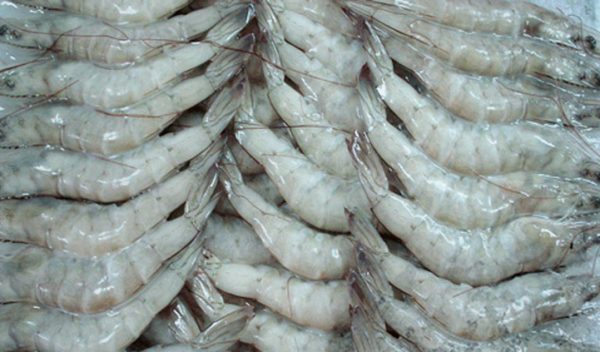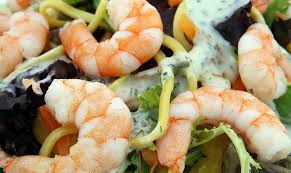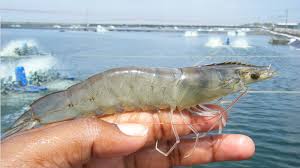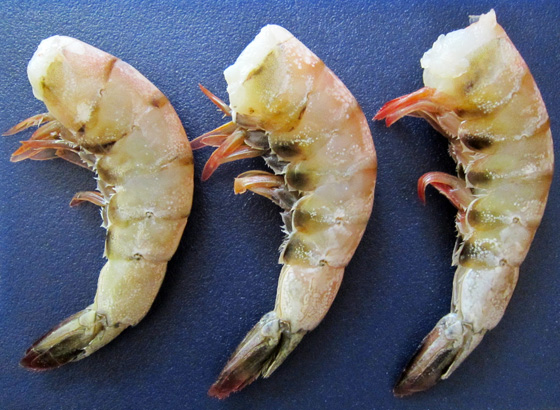The latest in the so-called aqua-farming projects in South Africa . . .
Big Prawns
Called SeaArk Africa, the R9bn marine farming project in the Coega industrial development zone in the Eastern Cape promised to produce the biggest prawns in South Africa to all who could afford it, as well as jobs galore.

The 1 200ha high-tech facility was touted as the world's first environmentally friendly prawn farm, with solid political backing in the Eastern Cape. It boasted several Eastern Cape ANC heavies on its board.
SeaArk claimed to have perfected the world's first closed biosecure farming system, which could grow prawns two or three times faster than its competitors.
It also promised to employ 11 000 people.
But all the promises turned to dust and despite building what appeared to be a state of the art plant, SeaArk closed down in 2009 without ever getting into commercial scale production.
It all started when an American called David Wills convinced Watson that his brand of organic prawn farming was the next big thing back in 2005. Wills soon arrived in South Africa in full force and it seemed Bosasa's prawn farmers were in business.
Wills became president of SeaArk, and was put in charge of the pilot project.
By 2007 Bosasa announced to the world that it would open the world's first environmentally friendly prawn farm, and boasted about its huge prawns that could be grown in record time.
During a visit to the farm, Wills himself pulled fantastically sized prawns from ponds, housed in a space-age type facility. Construction was buzzing and restaurants in Port Elizabeth were salivating to get their hands on the prawns.
Using a computerized control system, Wills said the ponds were heated to an optimum temperature, algae levels were controlled and the water quality strictly managed to produce his "organic" prawns.
SeaArk farmed the Pacific white shrimp, which is highly susceptible to viral infections that wiped out populations and could be transmitted to indigenous prawn species. But adding antibiotics to prawns diminished its value because organic prawns fetched a premium price.
Wills insisted his prawns were farmed without any antibiotics, and that he kept it healthy by "eliminating" factors that spread diseases.
"It would take a criminal act to sabotage my farm," he said.
Fraudster farmer
But the criminal was already present. Wills was a convicted fraudster and well known in US circles as pretending to advance animal rights, while actually exploiting them for financial gain.
Bosasa's international partner was, in fact, a disaster waiting to happen. In 1995 Wills was sacked as vice-president of one of the world's largest animal rights organisations, the Washington-based Humane Society of the US, after being accused of fraud and sexual harassment.
In 1999, he was sentenced to six months in jail and fined $67 800 for embezzlement, with prosecutors alleging that he gambled the money away in Las Vegas.
When the Mail & Guardian revealed Wills' chequered past, AGO spokesperson and director, Papa Leshabane said that Bosasa considered Wills to be one of, if not the US's most knowledgeable authority on all aspects of aquaculture.
Watson also denied at the time that Wills had a criminal record and downplayed Wills' involvement in the project. He told the M&G that Wills was only one of a team of guys SeaArk employed.
"Sure, there was some stuff he was involved in, but that was a long time ago," Watson said. "He is renowned in the prawn industry."
Environmental concerns
Wills' claims that the project was environmentally sound also backfired when it sparked furious objections from local environmentalists, including SA National Parks. At the time, there were allegations that the Eastern Cape Environmental Impact Assessment (EIA) had been fast-tracked because of Bosasa's political connections.
Funding became a struggle for SeaArk, and after lying about an alleged R70m Saudi Arabian deal, no more money flowed into the project. Leshabane blamed a lack of investment and Eskom's escalating electricity tariffs for its resulting death.
Child molesting allegations
After SeaArk collapsed Wills returned to Texas to start another multimillion-dollar prawn farming venture called Global Blue Technologies-Cameron (GBT-C). There it emerged that apart from being a fraudster, Wills may be a child molester as well. He was arrested in 2015 on federal charges of child trafficking.
Prosecutors allege that Wills paid a woman to have sex with her daughter over the course of several years, starting when the daughter was nine years old. After several delays, Wills is now scheduled for trial next month, and the charges are of such a nature that the 66-year-old will spend the rest of his life in US federal prison if convicted.

In hindsight associating with a character like Wills was probably not the best idea that Bosasa had. It also later emerged that the project's Australian lead scientist was the real brains behind the operation and he later sued SeaArk over the project's intellectual property rights.
Gauteng Prawn Farming
But Bosasa was not yet done with its prawn farming. Six years after the Eastern Cape plant had failed, it announced that it would open a multimillion-rand prawn farm on the West Rand, near Bosasa's headquarters in Krugersdorp. Instead of SeaArk the new venture would be named Bio-Organics.
The Gauteng government threw its weight behind the project, which is not surprising taking into account Agrizzi's testimony about Bosasa's links with Gauteng ANC leaders such as Nomvula Mokonyane.
The new venture aimed to build on the technology of the old Eastern Cape plant, although Bosasa was tight-lipped about the technology in the wake of the law suit.
Questions on water usage, electricity supply and disease control also dogged the new plant.
The farm survived just long enough to provide the starter to Zuma's birthday party in 2015, which Bosasa had also sponsored.

"The project is aptly named Bio-organics," Bosasa wrote in a newsletter on the website.
Like the Eastern Cape project, it again promised jobs.
"Bosasa has a unique approach to aquaculture. Not only does it have the potential to contribute to [the] rural development plans of our nation, but it also promises to bring employment to these almost abandoned parts of the country."
Despite its backing the Gauteng government admitted no EIA had been done for the project and referred all queries back to Bosasa, who refused to discuss Bio-Organics.
The project never got off the ground and by 2017 Bosasa was once again failed prawn farmers.











Comments
Nonetheless, I'm definitely glad I found it and I'll be book-marking
and checking back frequently!
Here is my website: Credit Repair Companies Baytown TX: https://baytown.creditrepair.repl.co/